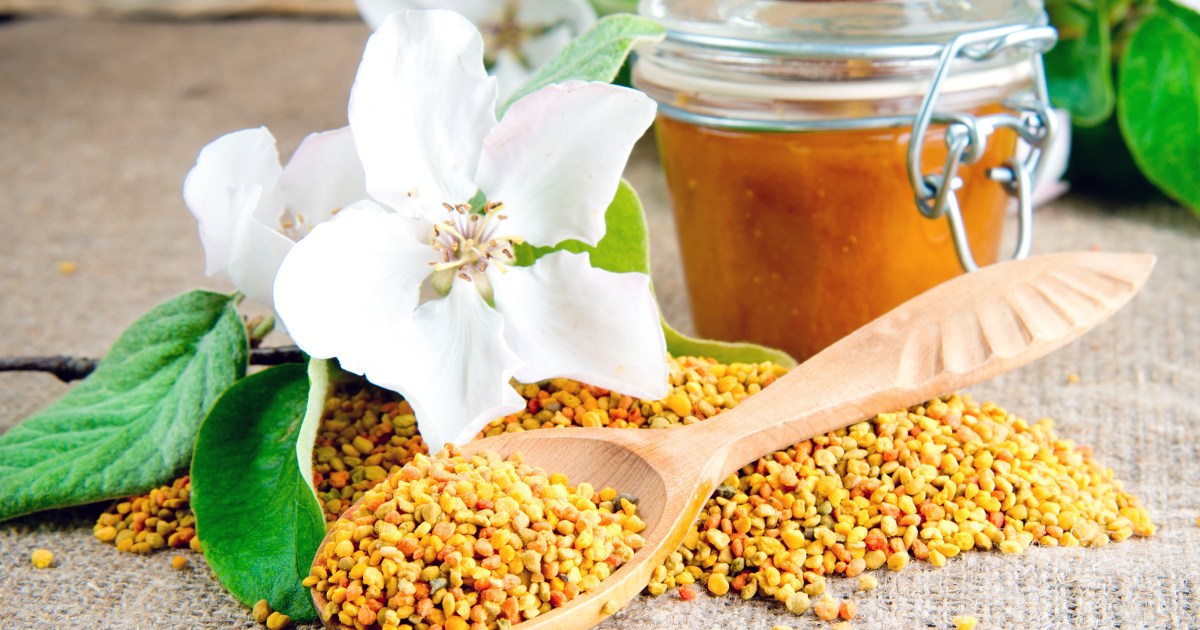Bee Pollen represents a useful food component that helps boost immunity, is anti-inflammatory and anti-microbial, and it is recommended to include it in your diet, especially in winter.
Bee pollen is a mixture of flower pollen, nectar, enzymes, honey, wax and bee secretions. Honey bees collect pollen from plants and transfer them to the hive, where they are stored and used as food for the colony.
Pollen contains more than 250 biologically active substances, including proteins, carbohydrates, fats, fatty acids, vitamins, minerals, enzymes, and antioxidants.
The pollen grains are:
Carbohydrates: 40%.
Protein: 35%.
Water: 4-10%.
Fat: 5%.
Other materials.
In the report published by the French magazine Marie France, in which it was also quoted on the Health site, the writer Victoria Headossi reviewed the benefits of pollen, stressing that these tips are general and for guidance only, as pollen is not a cure for any disease or a way to prevent Corona or influenza.
1- Pollen can boost the immune system
It is especially recommended to consume pollen in the winter, as it helps to maintain good health and fight seasonal infections such as cold or flu.
American dietitian Jackie An-Nahar explains in the journal "Health" that "according to a study published in the" Journal of Food and Agricultural Science ", in March 2016, it was found that bee pollen helps your body to restore its internal balance, which means that your immune system is not in Hyperactivity "state.
In other words, this study shows that pollen can help regulate the immune system and prevent it from being weakened.
2- Bee pollen can have an anti-inflammatory effect
The author states that researchers have discovered that bee pollen has anti-inflammatory properties.
Dietitian Dr. Lisa Moskowitz explains, "We all go through stages in which we suffer from infections, sometimes acute, long-term or sometimes chronic. The anti-inflammatory components reduce stress in the body during these times when it weakens and help it prevent infections resulting from infections." .
How often should bee pollen be consumed?
Most studies show that the ideal amount for noticing a benefit from pollen is between 20 and 40 grams per day, or 3 to 5 tablespoons.
Conversely, Lisa Moskowitz says pollen should not be a panacea either.
Although pollen is an excellent option to stimulate the immune system, eating it does not mean that it protects you from corona, any infectious disease, cold or flu, nor does it substitute for social distancing and personal hygiene guidelines.
And according to scientific studies, regular consumption of bee pollen will provide health benefits after about 3 months.
It is always advisable to consult your doctor or naturopath in order to take the correct daily dose of any dietary supplement.
What are the downsides of pollen?
On the other hand, nutritionist Ian Marber warned - in an article in The Telegraph - of the side effects of bee pollen, and said that taking bee pollen as a supplement might trigger an immune response.
Reactions can include itching, swelling, sensitivity to sunlight, sneezing and, in very rare cases, anaphylaxis.
Marber said that while the concentration of nutrients in pollen deserves great encouragement, the potential for the immune response is equally concerning.
"During my stay at a high-end spa in Thailand, I tried bee pollen for the first time, with a little fruit and yogurt for breakfast. The rest of the day I had a slight itch, and in direct sunlight I felt uncomfortable," Marber spoke of his experience.
"I added bee pollen to breakfast the next day, and within 20 minutes my skin felt as if it was on fire, and spent the rest of the day in a cool, dark room hoping the discomfort would end. By that time, I had realized that the only different thing I did was." Is eating pollen. "
Therefore, we confirm the following:
You should consult your doctor before consuming bee pollen.
Attention is required if you suffer from allergies or asthma, you should be more careful and see a doctor. Less use bee pollen.
Bee pollen cannot be a substitute for a balanced diet, regular physical activity and restful sleep.
If you develop any symptoms after taking bee pollen, stop immediately and see a doctor.
If you develop symptoms of anaphylactic shock, use an injection of adrenaline and then call 911 immediately.
What is allergic shock?
According to the specialist in allergic diseases, Marcus Fornelli, anaphylactic shock is a severe, life-threatening allergic reaction, and some people occur when they ingest substances that cause them allergies, and the body responds to these substances by activating the immune system, by releasing various substances such as histamine, which leads to Vasodilation, drop in blood pressure, and swelling in various organs in the body such as the lungs and the skin.
The symptoms of allergic shock are as follows:
Shortness of breath.
Difficulty swallowing.
Heaviness in the tongue hinders the ability to speak.
A drop in blood pressure.
nausea.
Loss of consciousness
The causes of allergic shock differ from one person to another, but allergic shock often affects people who suffer from allergies to certain foods such as nuts or pumpkin seeds, or to medicines, or even from substances that enter the body through a bee sting, for example.
Doctors advise those who suffer from allergies to acquire a first aid box, anti-allergic and an injection of adrenaline, which is a needle that the patient can self-inject with, and help save the patient by transferring blood to important organs in the body such as the heart, brain and kidneys.
Allergy specialist Francesca Rove summarizes how to use an adrenaline injection in 3 steps:
Remove the protective cap (safety valve).
Squeeze the needle with a firm grip on the thigh.
Keep pressing for 10 seconds, and then go to the hospital directly for the necessary tests.

